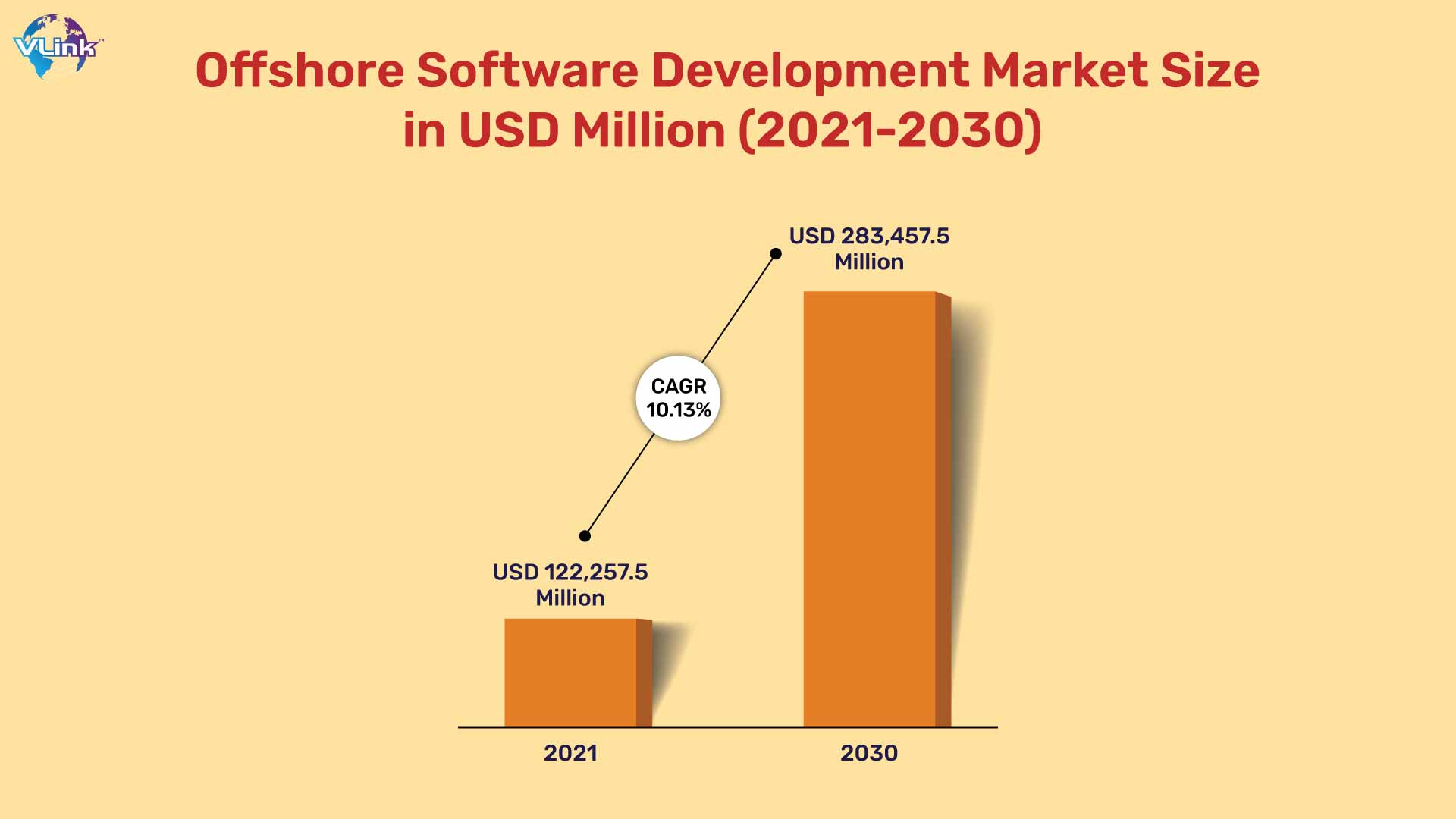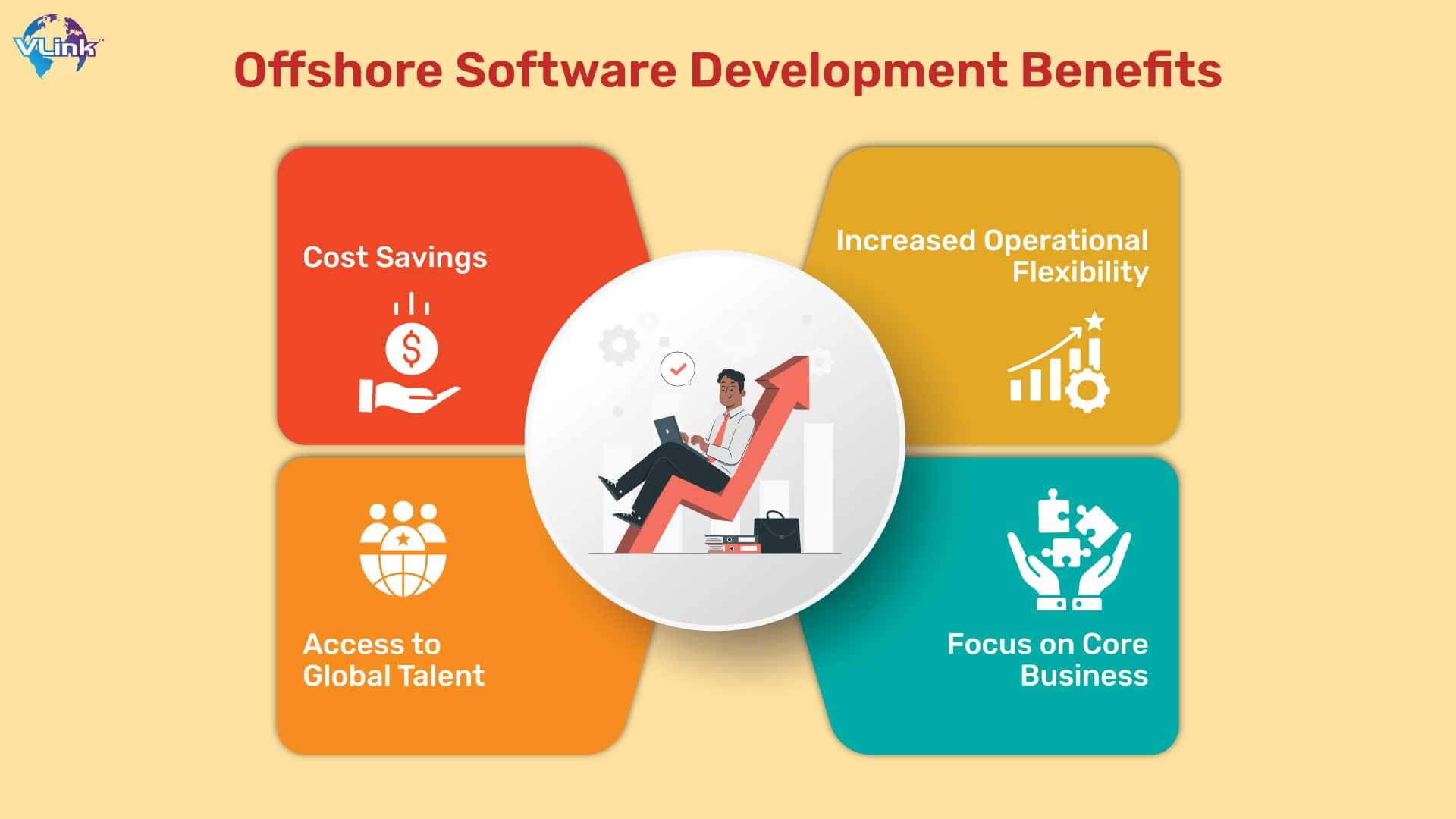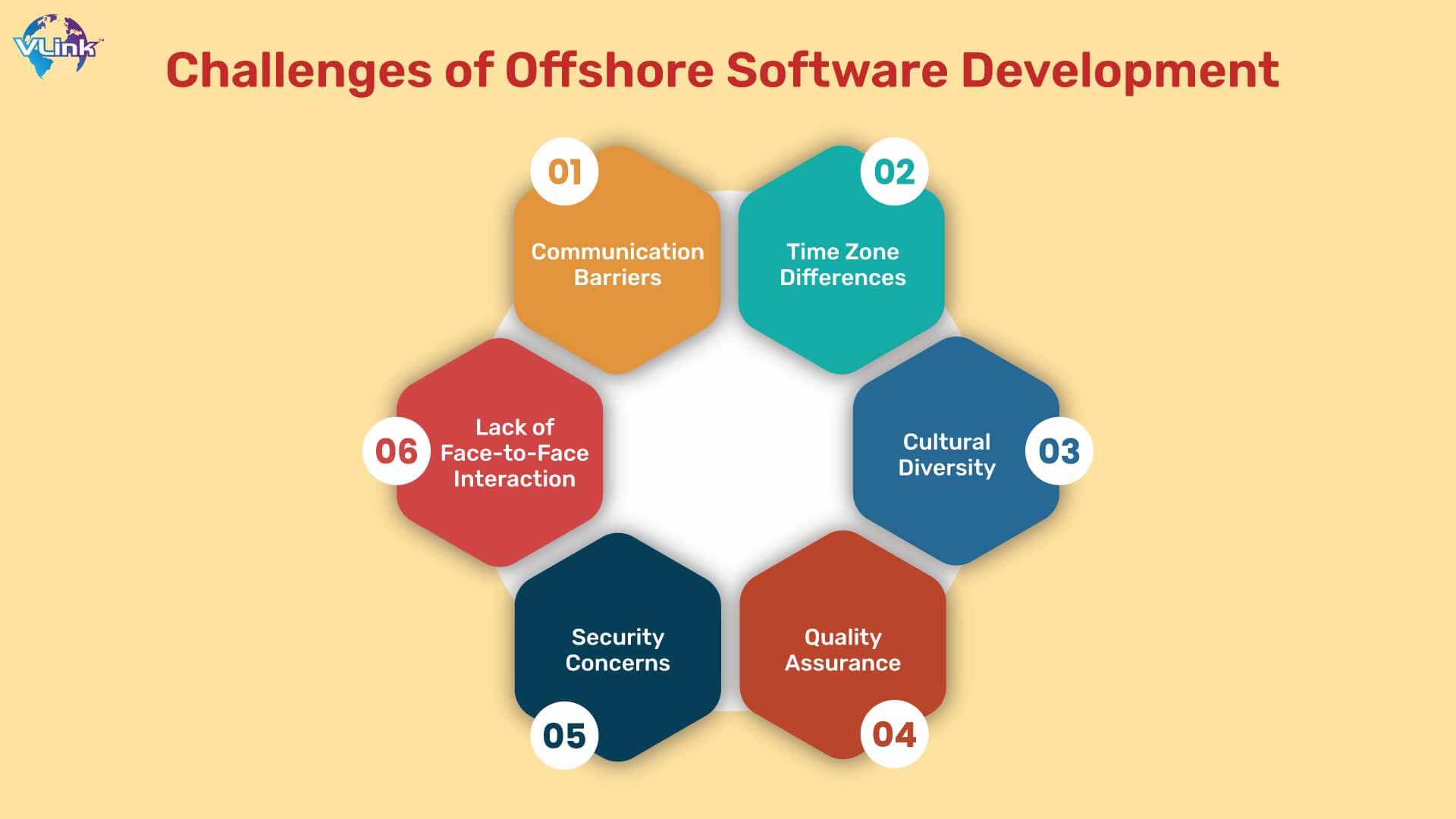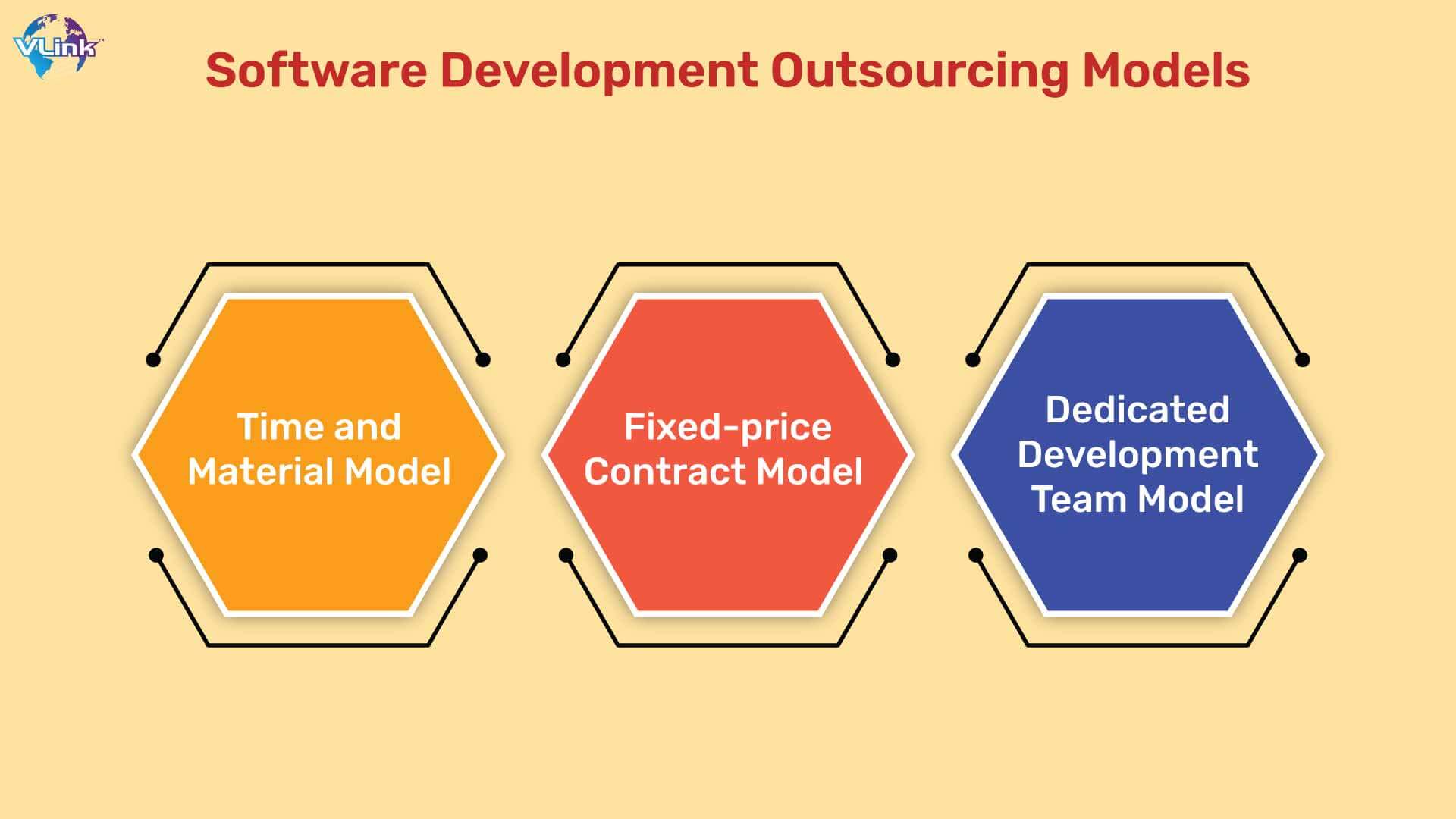Offshore services, outsourcing, and third-party strategic partners are different terms for the same concept. Over the years, outsourcing or offshore became the choice for organizations when they wanted a project completed in less time, that too, for a lesser cost.
In 2021, the Offshore Software Development Market was valued at USD 122,257.5 Million. It is anticipated to witness substantial growth, reaching USD 283,457.5 Million by 2030, with a projected CAGR of 10.13% from 2022 to 2030.

Business establishments must understand the nuances of outsourcing or hiring an offshore company to work on their projects.
Making the wrong decision usually affects the project delivery and the organization's brand name. Making the right choice will bring profits and success. Let's consider ways to choose an offshore software development partner by overcoming the challenges.
Let's first start with basic information about offshore software development:
What is Offshore software development?
Offshore software development refers to outsourcing software development tasks to a company in a different country. This model allows businesses to access a global talent pool, often benefiting from cost savings, specialized skills, and faster project turnaround.
Offshore development teams collaborate remotely, communicating through digital channels, to create software solutions tailored to the client's requirements.
While it offers advantages like scalability and efficiency, effective communication and project management tool are crucial to overcoming potential challenges such as time zone differences and cultural diversity.
What are the Benefits of Offshore Development Services?

Here are several reasons both startups and established organizations want offshore custom mobile app development for business.
You gain access to the top IT talent in the industry without hiring them on the payroll. Geographical restrictions won't be a problem either. In short, nothing comes between you and the best software engineers.
A software development project puts much work pressure on existing employees, especially if you need a dedicated in-house team. Outsourcing the task ensures that your current project's timelines run smoothly.
There is no denying that you sometimes need an expert to handle a software project. Hiring offshore app development services is a cost-effective way to achieve this. The leading offshore software development companies have senior developers with domain expertise.
Your existing teams may not take up any more work within the given deadline. Outsourcing is the solution to this. It saves time, money, and effort without compromising quality.
The size and complexity of the software project are fine when you outsource it. The most significant benefits of outsourcing software development are flexibility and scalability. The offshore company can add more members to the team on demand if/when necessary.
Challenges You Can Face During Offshore Software Development

Effective communication is paramount in software development. Offshore teams may face challenges due to language differences, cultural nuances, and time zone variations. Misinterpretations or lack of clarity can lead to misunderstandings, affecting the project's progress.
Clear communication channels, regular updates, and collaboration tools are essential to overcome this. Video conferences, documentation, and establishing common terminology help bridge communication gaps.
Working across different time zones can result in delays, and overlapping working hours may be limited. It can hinder real-time collaboration and communication, potentially slowing development.
Adopting agile methodologies with flexible schedules, setting ordinary working hours for critical meetings, and using asynchronous communication tools can help mitigate these challenges.
Diverse cultural backgrounds among team members may impact collaboration and understanding. Varying work styles, expectations, and approaches to problem-solving can lead to friction.
Promoting cultural awareness, conducting team-building activities, and fostering an inclusive work environment helps create a cohesive and collaborative offshore team.
Ensuring the quality of the software is challenging when the development team is geographically distant. Differences in testing standards, methodologies, and tools may arise.
Implementing a robust quality assurance process, including comprehensive testing protocols, automated testing tools for software product development and periodic on-site visits for training and collaboration, helps maintain high-quality standards.
Offshore development involves sharing sensitive business information and intellectual property. Security breaches, data leaks, or unauthorized access are significant concerns.
Establishing stringent security protocols, including secure data transmission, confidentiality agreements, and compliance with data protection regulations, is essential. Regular security audits and monitoring can help safeguard against potential risks.
Building trust and rapport among team members is often easier through face-to-face interactions. Offshore teams may lack this advantage, potentially affecting team dynamics and cohesion.
Periodic on-site visits, virtual team-building activities, and leveraging video conferencing for personal interactions help bridge the gap and foster a sense of camaraderie among team members.
Tips to Choose IT Outsourcing Company
Choosing the right offshore software development company is vital for organizational success. Here, we've got some simple yet effective tips to sieve the prospective managed IT service providers and choose the best offshore IT company for your requirements.
Look for an offshore company that is good at communication. The team should be able to respond to your emails/messages and provide answers on time.
What kind of data security does the company offer? After all, you can't risk the details of your software project getting leaked.
What type of software development talent does the offshore company have? How many IT professionals can provide for your project based on the scope and delivery timeline?
What other services does the company offer? Choosing a service provider with a range of managed IT solutions is cost-effective, including attrition management, time-zone alignment, dedicated POC, training, etc.
Read the testimonials by previous clients to get their reviews for more information.
Software Development Outsourcing Models

Outsourcing software development requires planning and understanding. Depending on your requirements and specifications, you need to determine the best model for the project.
As the name suggests, this outsourcing model depends on the time the offshore development company spends on your project. It is an effortless way to hire offshore developers for long-term projects. You pay the company every month for the time and effort. It is flexible, scalable, and works well for small companies.
In this model, you hire an offshore IT development team for a fixed price. There won't be endless budgeting or extended payments. This model suits shorter durations and small to mid-sized projects.
It helps when you have a fixed budget, though the pressure is on the developers to ensure they don't overshoot the upper limit. In addition, you can't be an active participant in the project.
A dedicated IT team is the best offshore software development model for long-term projects with changing requirements. A specialized IT team is built exclusively to work on your project. You pay the team every month as per the terms agreed upon in the contract.
While the overall cost is high, this model guarantees quality services and continuous communication between you and the offshore team.
How you manage offshore IT development services also determines the extent of your success.
Define your goals clearly. The software development team should know the purpose of the project and the expected result.
Build a roadmap to streamline the various aspects of the project. Work with the offshore team to prioritize your requirements.
Make a detailed list of conditions and specifications. Talk to every member of the team and get their input.
Documentation is essential for quality and process control in software development. It ensures consent and expectations with the necessary information to make changes, updates, etc., to the software development phases.
VLink has offered digital transformation and custom offshore software development services since 2006. We work with organizations of all sizes around the globe and have a vast client base in the United States and APAC countries.
Many SMBs, startups, and Fortune 500 companies are among our trusted and happy clients. Our dedicated development team believes in providing transparent, reliable, affordable, and high-quality offshore mobile app development services to Startups, SMBs, and large enterprises.
Get in touch today so we can work with you on your IT team challenges.









 Shivisha Patel
Shivisha Patel

















